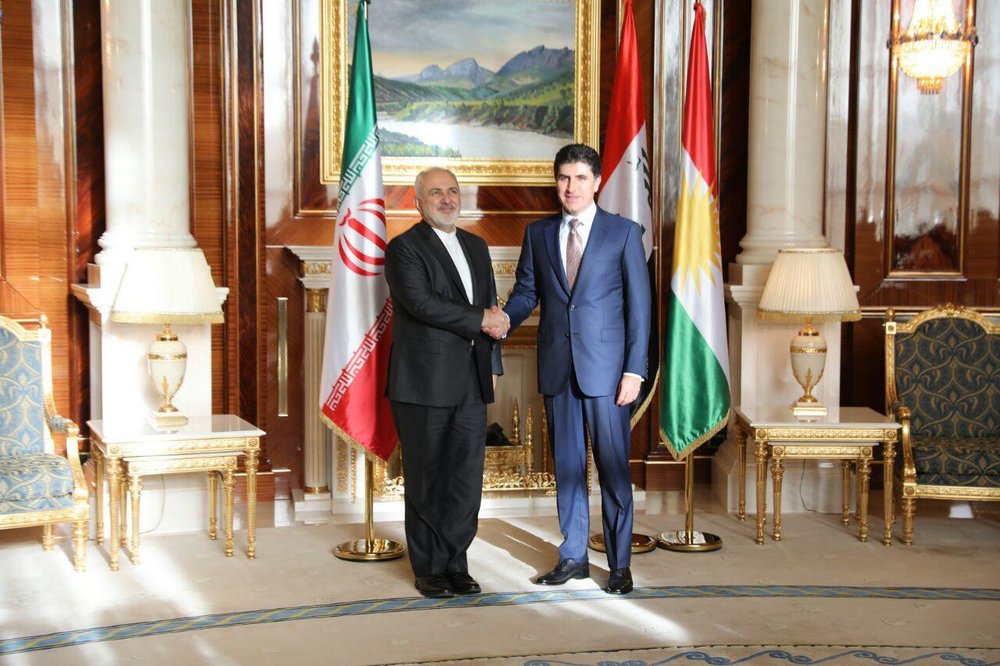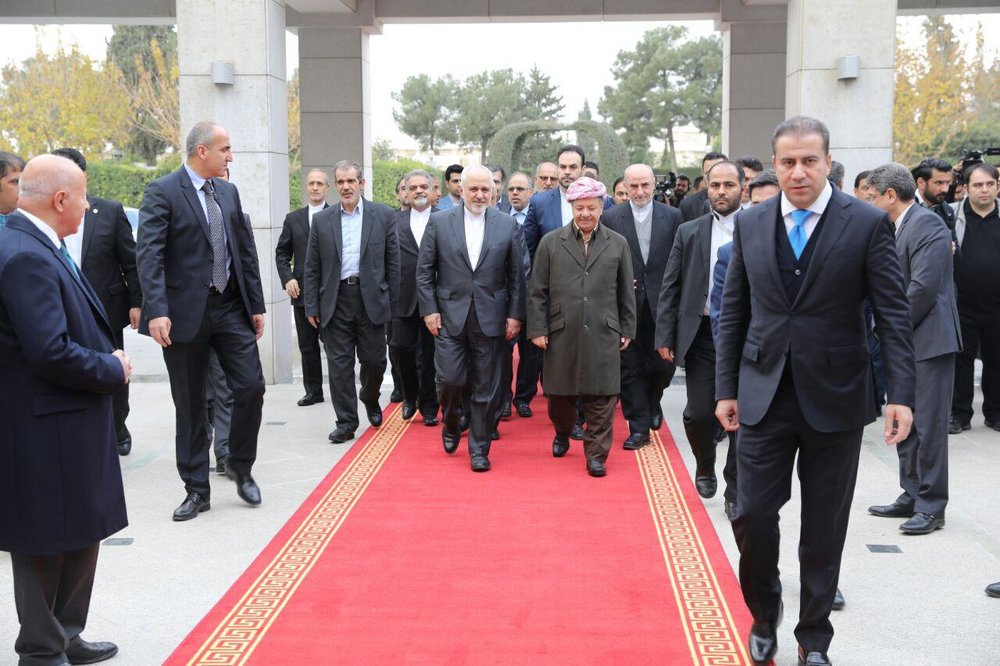Tehran, Erbil stress friendly bonds

TEHRAN – Foreign Minister Mohammad Javad Zarif on Tuesday made a tour of the Kurdistan Region in Iraq to review and reiterate close ties between the Islamic Republic and the Kurdistan Regional Government (KRG).
In his meeting with Zarif, KRG Prime Minister Nechirvan Barzani praised Iran’s support for the Iraqi Kurdish people during attacks by the Daesh terrorist group and said the Kurds will never forget Tehran’s backing.
Barzani described bilateral relations between Tehran and the KRG as very significant and called for closer cooperation in various areas, including economy and trade.
Barzani further pointed to Iran’s support for Kurds during the Daesh terrorists’ invasion of the Iraqi Kurdistan Region, saying that the people of Kurdistan will never forget the support.
Zarif, for his part, hailed the ties between Iran and the Republic of Iraq as well as the KRG as “age-old, outstanding, and constructive” and said the trade relations are expanding.
Heading a high-ranking political and economic delegation, Zarif arrived in Erbil this morning after visiting the Iraqi capital of Baghdad and meeting with top officials of the Arab country.
Daesh militants made swift advances in much of northern and western Iraq over the summer of 2014, after capturing large swaths of northern Syria.
However, a combination of concentrated attacks by the Iraqi military and the volunteer forces, who rushed to take arms after top Iraqi cleric Ayatollah Ali al-Sistani issued a fatwa calling for fight against the militants, led to the collapse of the Daesh.
In November 2017, the self-proclaimed caliphate of Daesh collapsed after Syrian and Iraqi armed forces and their allies managed to recapture the terror group’s last strongholds in the two Arab countries.

Later the day, Zarif met with Leader of the Kurdistan Democratic Party (KDP) Masoud Barzani.
Zarif also addressed a gathering of business people from both Iran and the Iraqi region in Erbil on Tuesday, calling for stronger ties.
He praised the brotherly and historical relations between the two sides and called for closer Tehran-Erbil cooperation.
The Iranian foreign minister further said that the unilateral sanctions imposed by the United States on Iran would fail to affect and hamper Iran’s relations with Iraq’s Kurdistan region.
“Sanctions will fail to create an obstacle in the way of expanding economic ties between Iran and Iraq,” he said, adding that Iran was “a highly reliable partner” for all of its friends, “particularly Iraq’s Kurdistan region.”
Zarif also said that the security of the Islamic Republic is intertwined with and “inseparable from” that of Kurdistan, expressing support for the central government in Baghdad as well as the Kurdistan Regional Government (KRG).
Speaking on the sidelines of the economic forum, Barzani hailed Zarif’s visit as an indication of the “deep-rooted and good relations” between Iran and the Iraqi Kurdistan.
He further praised Iran’s support for the Kurds when the Takfiri Daesh terrorists were wreaking havoc in the region.
Dara Jalil Khayat, the chairman of the Kurdistan Federation of Chambers of Commerce and Industry, who also attended the economic forum, put the volume of trade exchanges between Tehran and Erbil at $6 billion, expressing hope for the expansion of economic ties between the two sides.
He further said that a joint committee would be established to deal with the existing economic problems.
Zarif, in a tweet on Tuesday, highlighted the positive outcomes of the Iran-Iraq Joint Trade Conference in Baghdad and said the doubling of the bilateral trade “is on the horizon”.
“Today, I, accompanied by 6 Iraqi ministers, addressed hundreds of participants at the Iran-Iraq Joint Trade Conference; exploring paths to significantly expand bilateral trade and investment,” Zarif wrote.
“With implementation of shared vision, doubling of annual trade volume is on the horizon,” he added in his tweet.
On Monday, the Iranian top diplomat met in Baghdad with Iraq’s President Barham Salih and exchanged views about a range of issues, including regional developments, and voiced his country’s willingness to enhance its relations with Iran.
In the meeting, Salih stressed the need to pursue political solutions to all regional problems, the Iraqi president’s office said in a statement.
Salih further highlighted the importance of bilateral relations between Tehran and Baghdad and voiced his country’s willingness to boost the ties.
He emphasized that closer bilateral relations not only serve both nations but also serve the security and stability of the entire region, according to the statement.
Iraq’s foreign minister said recently that his country is “not obliged” to abide by sanctions imposed by the U.S. against Iran and would be pursuing options to continue bilateral trade.
On December 20, the U.S. granted Baghdad a 90-day extension to a waiver on abiding by the sanctions that were re-imposed on the Islamic Republic in November.
Trade between the two neighboring countries is thought to amount to around $12bn, while Iran provides around 40 percent of Iraq's electricity needs.
Although Iraq faces possible censure by the U.S. if it fails to cease its trading with Iran by the end of the waiver period, Foreign Minister Mohammed Ali al-Hakim said his country could continue relations with Iran.
“These sanctions, the siege, or what is called the embargo, these are unilateral, not international. We are not obliged (to follow) them,” he said, speaking to a gathering of journalists on January 3.
SP/
Leave a Comment